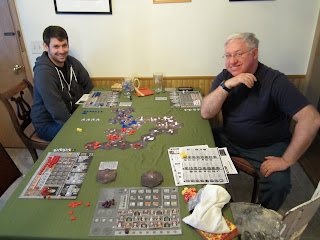 | |
| Eclipse, later in the game. Note the rows of blocks on the cards. |
This Eclipse game had this very novel way of handling economy. There were planets that you could colonize by removing a block from your board and placing it atop the little square on the planet. Underneath the block was a number, starting low but exponentially rising as blocks would be removed. What it made was a very quick and easy method of tabulating income, just look at the largest revealed number, and voila, there's how much money you're making. Subtract what you're buying, and adjust the slider on the outer track.
What I'm thinking for this upcoming Big Game is to have a system where players could start out on the board and capture objectives for their team. Each team would have a board, and if they captured an objective they'll remove a block (a penny, more likely) and that will reveal a number. Might be 250pts for the first penny, 500 for the second, 1000 for the third and so-on.
At the beginning of each team's turn the players will meet around their own economy board and decide who gets the points to bring into the game, dropping them into specific landing zones that they've captured. They'll subtract the value of the units they are bringing in, and put the rest of the points back into the kitty to be added to the economy next turn.
A player could arrive mid-way through the game and be allowed to bring 5,000 points directly into the game if his team had earned enough through capturing objectives.
How many objectives will there be? A lot. There has to be for something like this. Also, players beginning on turn one will have only 500 points, so it'll be on them to capture an objective, hold it, and build up some cash to bring on the rest of their army.
What else could be purchased with the economy? Orbital strikes, reinforcements for ruins, re-rolls, even victory points (that can't be refunded).
If everything goes as planned, Rob will be running the Big Game tournament side, and I'll catch the loser's bracket in a big-table drop-in slug fest. Folks can come at any time during the weekend and get in on this game, and even if someone comes with only 1200 points, they can still buy units that got creamed and can recycle them back onto the board. There's no reason why anyone would not be able to play the game, unless a team has absolutely no economy at all.
I think that might be when a team has lost.
1 comment:
It is extremely important to yell "BRaaaaainnnnns" when moving the zombies and always remember....
Johnny ain't goin' out like no chump!
Post a Comment